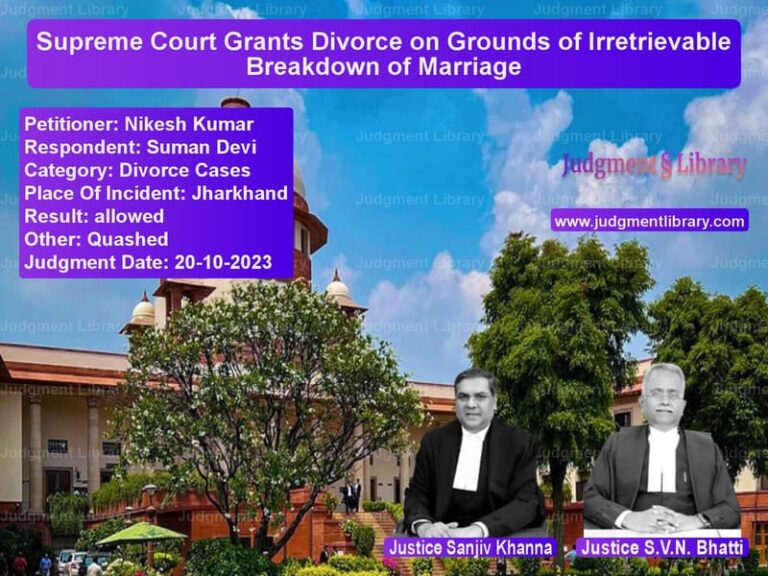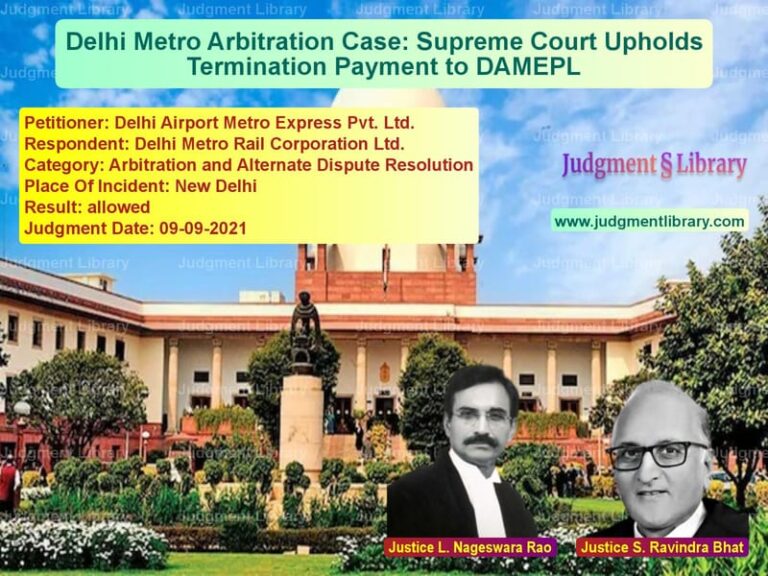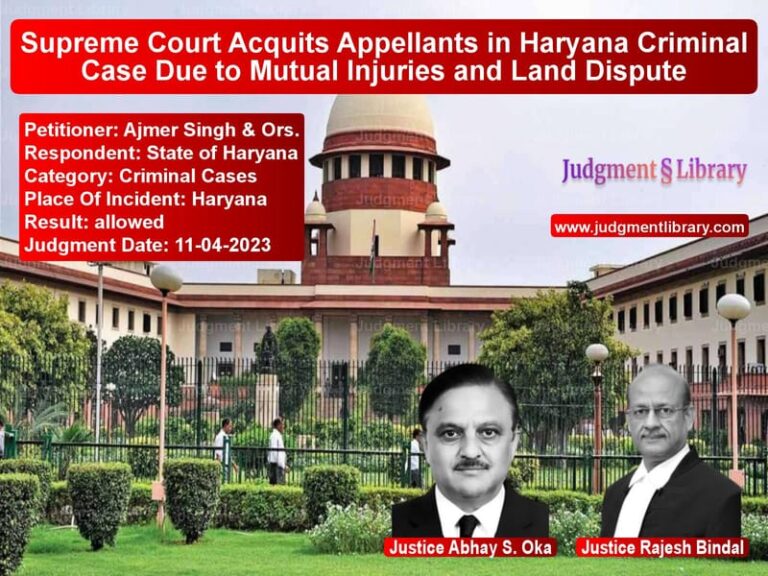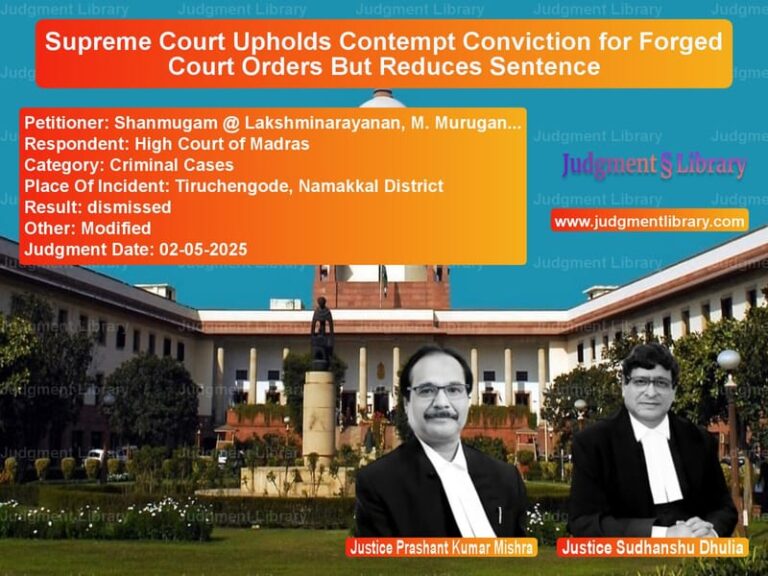Supreme Court Clarifies Discretionary Nature of Interim Compensation Under Negotiable Instruments Act
The Supreme Court of India recently delivered a significant judgment in the case of Rakesh Ranjan Shrivastava v. The State of Jharkhand & Anr., addressing the interpretation of Section 143A of the Negotiable Instruments Act, 1881 (NI Act). The ruling clarifies that the provision for interim compensation under Section 143A is discretionary and not mandatory, setting crucial guidelines for its application in cheque dishonor cases.
Background of the Case
The case originated from a complaint filed under Section 138 of the NI Act against the appellant, Rakesh Ranjan Shrivastava, by the complainant, respondent No. 2. The complaint alleged that the appellant had issued two cheques, totaling Rs. 4.25 crore, as part of a business transaction, but one of the cheques, amounting to Rs. 2.2 crore, was dishonored upon presentation.
During the trial, the complainant moved an application under Section 143A of the NI Act, seeking interim compensation. The Trial Court directed the appellant to pay Rs. 10 lakh as interim compensation within 60 days. The order was upheld by the Sessions Court and later by the Jharkhand High Court, prompting the appellant to challenge the ruling before the Supreme Court.
Petitioners’ Arguments
The appellant, represented by legal counsel, raised the following arguments:
- Section 143A uses the word “may,” indicating that the provision is discretionary rather than mandatory.
- The Trial Court should have evaluated the merits of the case before mechanically granting interim compensation.
- Since Section 143A allows for recovery of the amount as a fine, its application must be justified with sufficient reasoning.
- The order failed to consider whether the complainant had established a prima facie case against the accused.
- Interim compensation cannot be granted automatically in every case without examining the facts.
Respondents’ Arguments
The complainant and the State of Jharkhand defended the order, arguing:
- Section 143A was enacted to prevent delays in cheque bounce cases and ensure that the payee does not suffer financial hardship.
- Since the accused did not deny issuing the cheque, he should be required to deposit interim compensation.
- As per Section 139 of the NI Act, a presumption exists that the cheque was issued for discharge of liability unless proven otherwise.
- Failure to impose interim compensation would defeat the purpose of the NI Act, which aims to enhance the credibility of cheques in commercial transactions.
Supreme Court’s Observations
The Supreme Court examined the legislative intent behind Section 143A and its impact on pending cases under Section 138 of the NI Act. The key observations included:
- Discretionary, Not Mandatory: The Court held that the language of Section 143A clearly indicates that courts have discretion in granting interim compensation. The word “may” cannot be interpreted as “shall.”
- Factors to Consider: Courts must assess whether a prima facie case exists before directing interim compensation.
- Impact on the Accused: Imposing interim compensation without justification could result in unjust hardship on the accused, as the amount is recoverable even before guilt is established.
- Not an Automatic Rule: The Court clarified that an order for interim compensation must be well-reasoned and not granted as a matter of routine.
Key Judicial Remarks
In its final ruling, the Supreme Court stated:
“The exercise of power under sub-section (1) of Section 143A is discretionary. The provision is directory and not mandatory. The word ‘may’ used in the provision cannot be construed as ‘shall.’”
On the application of discretion, the Court observed:
“While deciding the prayer made under Section 143A, the Court must record brief reasons indicating consideration of all relevant factors.”
The Court further elaborated on the parameters for granting interim compensation:
- The court must evaluate the merits of the case, including the complainant’s claims and the accused’s defense.
- Factors such as the nature of the transaction and the financial status of the accused should be taken into account.
- If the accused presents a plausible defense, interim compensation may be refused.
- The quantum of interim compensation should be determined based on the specific circumstances of each case.
Final Judgment
The Supreme Court ruled:
- The order directing the appellant to pay Rs. 10 lakh as interim compensation was set aside.
- The case was remanded to the Trial Court for fresh consideration of the application under Section 143A.
- The amount already deposited by the appellant would remain with the Trial Court, pending a final decision.
- Courts must exercise discretion in granting interim compensation and provide proper reasoning for such orders.
Conclusion
This judgment provides much-needed clarity on the application of Section 143A of the NI Act. It ensures that courts do not mechanically impose interim compensation but instead consider the merits of each case. By reinforcing the discretionary nature of Section 143A, the ruling protects the rights of accused individuals while maintaining the integrity of cheque transactions. The decision serves as an important guideline for lower courts handling cases under the NI Act.
Petitioner Name: Rakesh Ranjan Shrivastava.Respondent Name: The State of Jharkhand & Anr..Judgment By: Justice Abhay S. Oka, Justice Ujjal Bhuyan.Place Of Incident: Bokaro, Jharkhand, India.Judgment Date: 15-03-2024.
Don’t miss out on the full details! Download the complete judgment in PDF format below and gain valuable insights instantly!
Download Judgment: rakesh-ranjan-shriva-vs-the-state-of-jharkha-supreme-court-of-india-judgment-dated-15-03-2024.pdf
Directly Download Judgment: Directly download this Judgment
See all petitions in Contract Disputes
See all petitions in Debt Recovery
See all petitions in Legal Malpractice
See all petitions in Judgment by Abhay S. Oka
See all petitions in Judgment by Ujjal Bhuyan
See all petitions in partially allowed
See all petitions in Remanded
See all petitions in supreme court of India judgments March 2024
See all petitions in 2024 judgments
See all posts in Civil Cases Category
See all allowed petitions in Civil Cases Category
See all Dismissed petitions in Civil Cases Category
See all partially allowed petitions in Civil Cases Category







